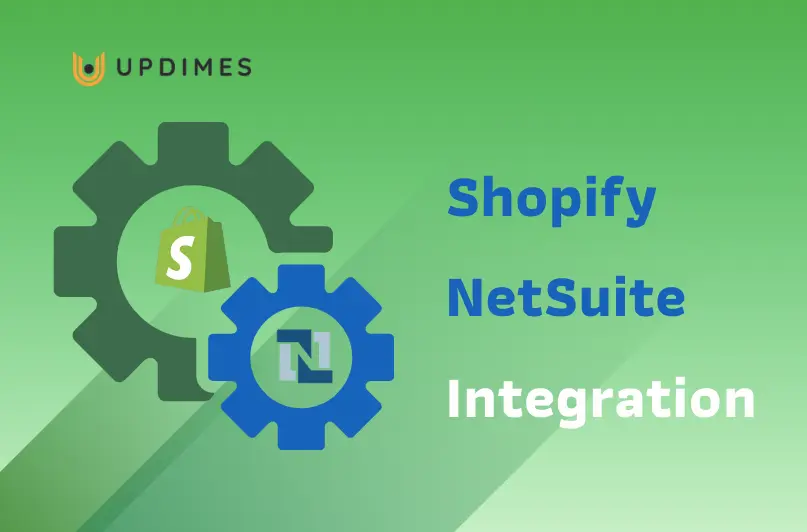Shopify NetSuite Integration: An Ultimate Guide

Do you feel exhausted from tackling inventory discrepancies, data entry blunders, and the hassle task of managing Shopify and NetSuite separately? If so, it's time to end the suffering with Shopify NetSuite integration.
But how can you achieve this seamlessly? Fear not! This guide will explain everything you need to know about integrating NetSuite with Shopify.
Let's dive right in and simplify your eCommerce operations!
What Is NetSuite Shopify Integration?
Shopify, established in 2006, is a top-tier eCommerce platform that empowers businesses to swiftly establish online stores and market products or services. With its intuitive interface, adaptable templates, and diverse feature set, including product and order management, payment processing, and marketing tools, Shopify caters to businesses of all sizes. It facilitates rapid online presence establishment, catering to both novice and proficient users alike, enabling scalable operations and global customer outreach.
On the other hand, NetSuite is a cloud-based ERP software suite that equips businesses with a comprehensive array of tools to manage diverse aspects of their operations. Acquired by Oracle Corporation in 2016, NetSuite offers modules for financial management, inventory management, customer relationship management (CRM), eCommerce, and more. Its integrated platform allows businesses to streamline processes, gain real-time insights, and scale their operations efficiently in a single unified system.
So, Shopify integration, an eCommerce platform, with NetSuite, a cloud-based ERP system. This integration allows businesses to synchronize data between their online store and backend operations, streamlining processes such as inventory management, order processing, customer data management, and financials for improved efficiency and accuracy.
Evaluate your Shopify NetSuite integration needs.
Assessing your integration needs for Shopify and NetSuite involves several steps:
Evaluate processes:
Begin by thoroughly mapping out all your current processes, paying close attention to manual and inefficient tasks. Identify where your team spends the most time and highlight any repetitive or error-prone activities. These are prime candidates for automation during the integration process.
Identify critical data:
Determine which data sets are essential for your operations, prioritizing accuracy and timeliness. This may encompass information such as orders, customer data, financial records, and SKU details. Ensuring the seamless transfer and synchronization of this data is crucial for successful integration.
Consider ROI:
Assess the potential return on investment (ROI) for integrating NetSuite with Shopify. You have to factor in the resource costs associated with manual processes, including labor hours and potential errors. Then, it would help to compare these costs with the overall expenses of implementing automation through integration. Understanding the financial benefits is essential for making informed decisions.
Choose integration approach:
Once you've evaluated your needs and assessed the potential ROI, it's time to decide how you want to integrate your eCommerce platform and ERP system. Evaluate whether your ERP offers native eCommerce integration capabilities or if you prefer to leverage the platform's APIs for custom integration.
Alternatively, you may opt for a third-party solution that provides pre-built integration templates tailored to Shopify and NetSuite. Selecting the right integration approach ensures a seamless and efficient workflow.
Following these steps, you can effectively assess your integration requirements and lay the foundation for a successful Shopify NetSuite integration.
Options for Shopify NetSuite Integration
When considering how to integrate Oracle NetSuite with Shopify and synchronize data between the platforms, several techniques stand out:
Point-to-point connectors/middleware:
- This method uses a direct connection to synchronize data such as inventories, orders, goods, and customers.
- Sellers must decide which system to prioritize and manage data mapping accordingly.
- Data is synced in batches at specified intervals, making it ideal for small enterprises with limited budgets using Shopify.
- However, as businesses grow or manage multiple channels, this approach's limitations become apparent. Integration complexity increases with the number of systems, and any failure in the process can disrupt the entire system and potentially incur additional costs.
Custom integration:
- With technological advancements, businesses increasingly opt for bespoke APIs, allowing quick and seamless integration.
- This method offers the highest level of customization and scalability for NetSuite integrations.
- However, it comes with high costs, requiring a dedicated team of experts for implementation and ongoing maintenance.
SaaS hosts:
- In this setup, third-party cloud-based services act as intermediaries between Shopify platforms and NetSuite.
- Unlike point-to-point integration, this arrangement provides flexibility and allows customization according to business requirements.
- Business owners have more control over data flow and can set rules for data transmission between systems.
- SaaS-based solutions offer scalability and expand with the company, providing real-time inventory management, product tracking, and enhanced security for an improved consumer experience.
Each integration approach has advantages and considerations, so Businesses should carefully assess their needs and resources before reaching a decision.
How To Integrate Shopify With NetSuite?
Now that you're familiar with Shopify and NetSuite, let's guide you through the process of integrating them:
Step 1: Select a Shopify NetSuite integration tool
Research and choose an integration platform, such as Robust NetSuite Integrator, based on your specific requirements, such as budget constraints or desired functionalities.
Step 2: Install the NetSuite to Shopify integration connector
Follow the installation instructions provided by the selected platform to establish a connection between Shopify and NetSuite. This may involve accessing Shopify's app store, installing the integration app, and configuring it within your NetSuite account.
For instance, installing Robust NetSuite Integrator would entail adding it from the Shopify App Store and setting it up within your NetSuite account.
Step 3: Configure integration Settings and data mapping
Ensure seamless data transfer between Shopify and NetSuite by configuring integration settings and mapping data fields.
For example, when synchronizing orders, match order status categories from Shopify (e.g., "Pending," "Paid," or "Shipped") with corresponding statuses in NetSuite (such as "Pending Fulfillment," "Billed," "Shipped"). This ensures automatic updating of order statuses across both platforms.
Step 4: Test the Integration
Before deploying the integration, conduct thorough testing, such as creating a test product in NetSuite and verifying its appearance in Shopify.
Step 5: Go live with the Integration
Once testing is successful and the connection is deemed reliable, activate the Shopify NetSuite integration for live operations.
Why Integrate Shopify With NetSuite?
Eliminate manual data entry and reduce costs.
By automating data synchronization between Shopify and NetSuite, you can eliminate the need for manual data entry, reduce errors, cut labor costs, and save valuable time and resources.
Manage inventory in real-time.
With real-time synchronization, you can accurately track inventory levels across both platforms, ensuring you never oversell or run out of stock.
Consolidate financial reporting
Integrating Shopify with NetSuite allows you to consolidate financial data from both platforms, providing a comprehensive view of your business's financial health. You can easily track expenses, revenue, and profitability with integrated financial data.
Enhanced customer experience
By integrating customer data between Shopify and NetSuite, you can provide personalized experiences and improve customer service, increasing satisfaction and loyalty.
Scalability and growth
As your business grows, integrated systems provide the scalability needed to support increased demand and expansion. With Shopify NetSuite integration, you can seamlessly scale your operations while maintaining efficiency and accuracy.
3 Best Shopify NetSuite Integration Solutions
Here's an expanded overview and key features for each Shopify NetSuite integration solution:
Robust NetSuite Integrator
Robust NetSuite Integrator is a comprehensive solution that seamlessly integrates Shopify with NetSuite, empowering businesses with efficient data synchronization and streamlined processes.
Key features:
- Real-time data sync: Ensures instant and accurate data synchronization between Shopify and NetSuite, minimizing delays and discrepancies.
- Customizable data mapping: Offers flexible mapping options, allowing users to tailor data fields according to their specific business needs for optimized integration.
- Financial data integration: Consolidates financial data from both platforms for comprehensive reporting and analysis, facilitating informed decision-making.
Satva Solutions
Satva Solutions offers flexible integration options and expert support to simplify the Shopify NetSuite integration journey, catering to businesses of all sizes and complexities.
Key features:
- Flexible integration models: Provides various integration options, including one-time migration or continuous synchronization, to meet diverse business requirements.
- Dedicated support team: Offers expert assistance throughout the integration process, ensuring smooth implementation and timely resolution of any issues.
- Scalability for growing businesses: Adapts to business growth and evolving needs, ensuring the integration solution remains scalable and robust.
APPSeCONNECT
APPSeCONNECT simplifies the integration process with pre-built connectors and scalable architecture, enabling businesses to achieve seamless connectivity and enhanced efficiency.
Key features:
- Pre-built connectors for Shopify and NetSuite: Offers ready-to-use connectors for effortless setup and quick deployment of integration workflows.
- Real-time data exchange: Facilitates real-time data exchange between Shopify and NetSuite, enabling up-to-date information availability across both platforms.
- Seamless multi-channel integration: Enables integration with multiple channels and applications, supporting omnichannel strategies and enhancing overall business agility.
Shopify NetSuite Integration: FAQs
Can you integrate Shopify with NetSuite?
Yes, it is possible to integrate Shopify with NetSuite to synchronize data and streamline operations between the two platforms.
How much does Shopify NetSuite integration cost?
The cost of Shopify NetSuite integration can vary depending on factors such as the integration solution chosen, customization requirements, and ongoing support needs. For accurate pricing information, it's recommended to request quotes from integration providers.
Does Shopify integrate with Oracle?
While Shopify does not offer native integration with Oracle, it is possible to connect Shopify with Oracle NetSuite using third-party integration solutions.
Final Words,
Shopify NetSuite Integration offers businesses a powerful solution to streamline operations, improve efficiency, and drive growth. Businesses can seamlessly connect their eCommerce platform with their ERP system by following the steps outlined in this guide, including evaluating integration needs, choosing the right integration approach, and implementing the integration solution.
With real-time data synchronization, automated processes, and enhanced visibility into operations, Shopify NetSuite integration empowers businesses to optimize their workflows, deliver exceptional customer experiences, and stay competitive in today's dynamic market landscape.
Take the first step towards a more integrated and efficient business ecosystem today!


